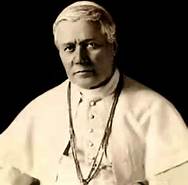Here are some excerpts from the Encyclical Letter Acerbo nimis, On the Teaching of Christian Doctrine, April 15, 1905. As you read this, think about what you are hearing–or not hearing–from the pulpit at your own parish. Also note what Pius X wrote about immorality in business and personal lives; things certainly have not improved in the last hundred years.
…How many and how grave are the consequences of ignorance in matters of religion! And on the other hand, how necessary and how beneficial is religious instruction! It is indeed vain to expect the fulfillment of the duties of a Christian by one who does not even know them.
We must now consider upon whom rests the obligation to dissipate this most pernicious ignorance and to impart in its stead the knowledge that is wholly indispensable. There can be no doubt, Venerable Brothers, that this most important duty rests upon all those who are pastors of souls. On them, by command of Christ, rest the obligations of knowing and of feeding the flocks committed to their care; and to feed implies, first of all, to teach. “I will give you pastors after my own heart,” God promised through Jeremias, “and they shall feed you with knowledge and doctrine.” Hence the Apostle Paul said: “Christ did not send me to baptize, but to preach the Gospel,” thereby indicating that the first duty of all those who are entrusted in any way with the government of the Church is to instruct the faithful in the things of God….
…Here then it is well to emphasize and insist that for a priest there is no duty more grave or more obligation more binding than this. Who, indeed, will deny that knowledge should be joined to holiness of life in the priest? “For the lips of the priest shall keep knowledge.” The Church demands this knowledge of those who are to be ordained to the priesthood. Why? Because the Christian people expect from them knowledge of the divine law, and it was for that end that they were sent by God. “And they shall seek the law at his mouth; because He is the messenger of the Lord of Hosts.” Thus the bishop speaking to the candidates for the priesthood in the ordination ceremony says: “Let your teaching be a spiritual remedy for God’s people; may they be worthy fellow-workers of our order; and thus meditating day and night on His law, they may believe what they read, and teach what they shall believe.”…
…In order to enkindle the zeal of the ministers of God, We again insist on the need to reach the ever-increasing number of those who know nothing at all of religion, or who possess at most such knowledge of God and Christian truths as befits idolaters. How many there are, alas, not only among the young, but among adults and those advanced in years, who know nothing of the chief mysteries of faith; who on hearing the name of Christ can only ask: “Who is He…that I may believe in Him?” In consequence of this ignorance, they do not consider it a crime to excite and nourish hatred against their neighbor, to enter into most unjust contracts, to do business in dishonest fashion, to hold the funds of others at an exhorbitant interest rate, and to commit other iniquities not less reprehensible. They are, moreover, ignorant of the law of Christ which not only condemns immoral actions, but also forbids deliberate immoral thoughts and desires. Even when for some reason or another they avoid sensual pleasures, they nevertheless entertain evil thoughts without the least scruple, thereby multiplying their sins above the number of hairs of the head. These persons are found, we deem it necessary to repeat, not merely among the poorer classes of the people or in sparsely settled districts, but also among those in the higher walks of life, even, indeed, among those puffed up with learning, who, relying upon a vain erudition, feel free to ridicule religion…
…What We have said so far demonstrates the supreme importance of religious instruction. We ought, therefore, to do all that lies in our power to maintain the teaching of Christian doctrine with full vigor, and where such is neglected, to restore it; for in the words of Our predecessor, Benedict XIV, “There is nothing more effective than catechetical instruction to spread the glory of God and to secure the salvation of souls.”
(trans. by J.B. Collins in Catechetical Documents of Pope Pius X, Paterson, N.J., 1946.)



